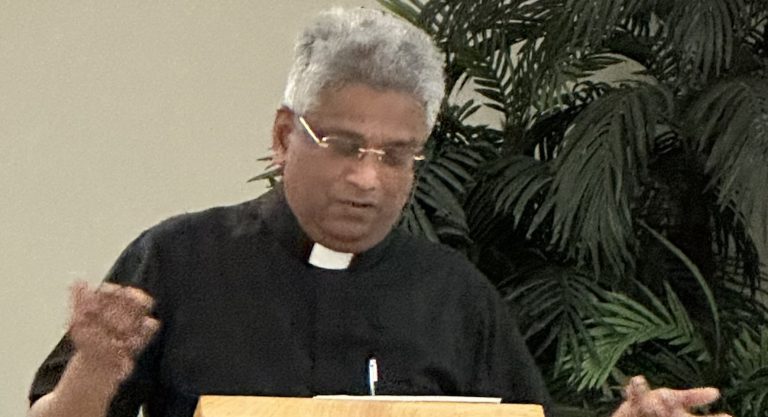First Reading • Deuteronomy 30:10-14
Psalm • Psalm 69:14, 17, 30-31, 33-34, 36, 37
Second Reading • Colossians 1:15-20
Gospel • Luke 10:25-37
When the communists took over Russia in 1917, many people feared that communism would spread throughout Europe. That was especially true for Christians who saw how brutally communists persecuted believers by imprisoning priests and closing churches.
So, when Adolf Hitler came to power in Germany, there were many people who supported him because he promised to crack down on communism. That was true even for many Christian clergy. One such person was Reverend Martin Niemöller, a pastor in the Lutheran Church.
However, Hitler did not stop with imprisoning communists. Eventually, he began cracking down on other groups who didn’t fit his idea of racial purity. And then he went after anyone who disagreed with him, including Christian believers. When Reverend Niemöller saw this, it became clear to him that, as a believer, he had to do something.
So along with some other Christian clergy, he founded The Confessing Church which sought to unite all German Protestant churches in opposition to Nazism. For his efforts, he was eventually put in a concentration camp and came very close to being put to death.
When the war ended, he was very honest about his failure to stand up for those who were persecuted by the Nazis. He spent the rest of his life working for peace in the world and for the end of nuclear weapons.
His confession of guilt was eventually made into a poem which is often quoted at memorials for Jewish victims of the Holocaust. One version of it, translated from the original German, reads;
When the Nazis came for the communists,
I kept quiet; I wasn’t a communist.
When they came for the trade unionists, I kept quiet; I wasn’t a trade unionist.
When they locked up the social democrats, I kept quiet; I wasn’t a social democrat.
When they locked up the Jews, I kept quiet; I wasn’t a Jew
When they came for me, there was no one left to protest.
Reverend Martin Niemöller’s words remind us that every injustice in human history was able to start because people let it happen. They stood on the sidelines and watched instead of speaking up and doing something about it.
That brings us to today’s gospel, the Parable of the Good Samaritan.
A man was in desperate need on the side of the road. Two men could have stopped to help them – a priest and a Levite, both of whom were religious men who served in the Temple. But they crossed over to the other side of the street. He was a Jew, like them. But they couldn’t be bothered. They choose to mind their own business rather than to help someone in need.
Who eventually helps? A Samaritan.
He had every reason to pass by and do nothing. Throughout history, Samaritans and Jews have hated each other. But this man does not see race or religion.
Rather, he sees a fellow human being who desperately needs his help. So, he stops and takes care of him.
Jesus holds up the Good Samaritan as a model of the kind of love that He requires of His followers. It is a love that finds the most abandoned and neediest, and cares for them. It is a love that cannot look the other way when someone is treated unjustly.
It is a love that cannot stay silent when people are being persecuted. It is a love that would give its own life to save another – no matter what that person’s race, religion, or nationality might be.
Why do we so often fail to love as Jesus calls us to?
Sometimes we have the attitude that what’s going on around us is none of our business, that it is someone else’s problem. We have enough problems of our own.
People who abuse their power are never content with just persecuting one group of people. So, whenever anyone is persecuted unjustly, it is our business, because eventually that injustice will come knocking on our door looking for us.
As Christians, we should have an even deeper reason for standing up for the needy and oppressed.
It is the love of Jesus. He died for every single person. There is no human person who is not made in God’s image and likeness. Therefore, there is no one whom we have a right not to love. There is no one we have a right to overlook. And there is no one we have a right to abandon when they need us.
Jesus made it very clear that we will be judged on how we treat the littlest among us. We cannot expect Jesus to save us in the next life if we have failed to save our brothers and sisters in this life.
Jesus came to this earth as a poor man so that we would learn to find Him in the poor. He gives Himself to us in a humble piece of bread, so that we would be able to discover Him in the humble. If we dare to stand up and receive communion today, then we must also dare to stand up and serve the poor and the persecuted without exception.

